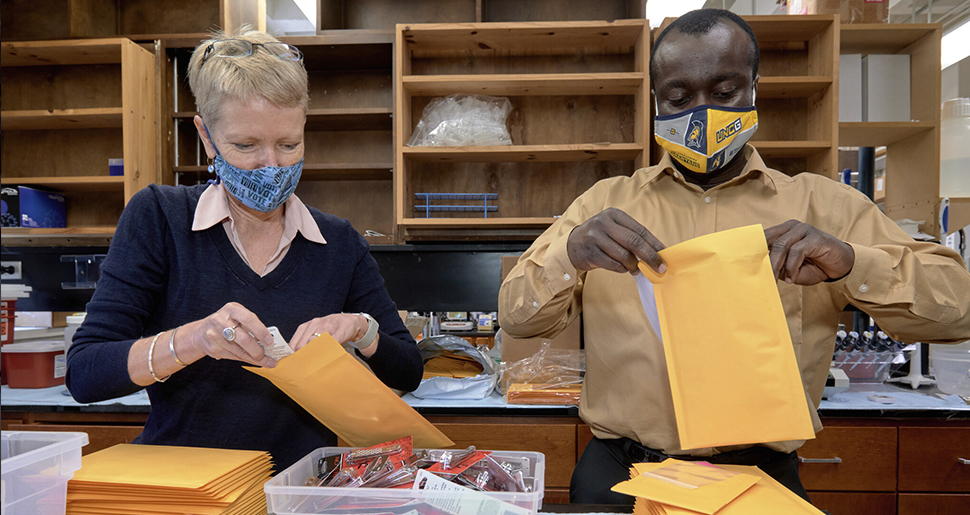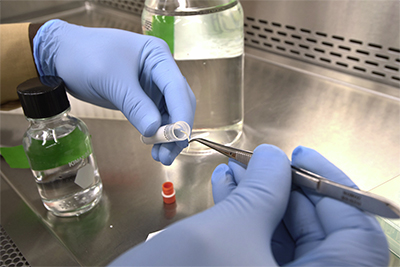
Dr. Seth Armah and Dr. Maryanne Perrin have spent a lot of time lately with toenails. The research duo are using clippings in a leading-edge study to investigate the contribution of selenium and zinc to the severity of COVID-19 infection.
In July, Armah and Perrin, both assistant professors in the Department of Nutrition, were jointly awarded close to $100,000 from the North Carolina Policy Collaboratory to investigate the relationship between micronutrient status and COVID-19 severity among North Carolinians. It is the first funding received in the School of Health and Human Sciences to specifically study the effects of COVID-19.
After the pandemic hit, Armah and Perrin quickly shifted course. The idea for the study was sparked by an email they received from a colleague, and Armah’s existing research and expertise in micronutrients – such as selenium, iron, and zinc – and inflammation. The email contained a study out of China showing that regions with low selenium levels in the soil had higher COVID-19 mortality rates.
At the time, they had yet to see any research demonstrating the impact of nutrition on health outcomes of individuals infected with COVID-19. So they put together a proposal.
— Perrin
That was June, when North Carolina had 25,000 cases of COVID-19. At press time, there were over 221,000 and 3,691 deaths.
The tricky part was figuring out how to recruit participants during a pandemic, as well as ensuring researchers were protected. They are working with Cone Health and Triad Adult and Pediatric Medicine to get the word out during weekly testing clinics.
“Luckily, the toenail is a good snapshot of zinc and selenium and the collection protocol can be done socially distanced,” Perrin said.
The subjects for the study will consist of 100 North Carolinians who have tested positive for COVID-19. Among this number will be 50 subjects who have had mild symptoms and 50 with severe symptoms. The researchers will ask them about their dietary patterns through online surveys and request toenail samples to determine the concentrations of zinc and selenium.
“We anticipate that subjects in the mild group will have more adequate levels of these micronutrients compared to those who experienced severe symptoms,” Armah said.
Selenium is an antioxidant, which prevents certain harmful compounds from damaging our cells and DNA. Armah’s past research focused on how selenium can reduce inflammation-related anemia. Many nutrients influence immune function and inflammatory status, he said. Also, selenium deficiency in humans has been associated with increased infection rates from viruses including Epstein Barr, Hepatitis C, and influenza in some studies.
The selenium content of food is largely influenced by the selenium content of the soil where the food is produced. Many counties in North Carolina have low selenium content, which may influence an individual’s selenium status and also their potential response to infection with COVID-19.
Zinc is equally important when it comes to immunity. Some studies have indicated that this micronutrient may inhibit the replication of different types of RNA viruses, including some coronaviruses.
Prior to Armah and Perrin’s study, the contribution of selenium and zinc status to the severity of COVID-19 infection had not been investigated.
Findings from the study would provide a new level of evidence in the relationship between micronutrients and COVID-19 prevention and could be a potential screening indicator for physicians.
“As people in the field of nutrition, we’re cautious about supplementation,” Perrin said. “A lot of vitamins and minerals can be toxic when taken in high quantities. We wouldn’t want people blanketly taking supplements without consulting their healthcare provider; instead, these minerals could potentially serve as biomarkers for peoples’ risk of severe complications from COVID-19.”
Story by Elizabeth L. Harrison, School of Health and Human Sciences
Photography by Martin W. Kane, University Communications